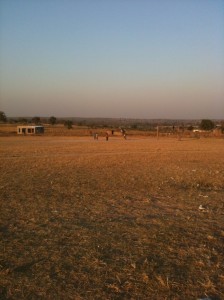Out of the Fire
 As I walk to my morning meeting, the sun quickly begins to warm the cold sand road. The clinging bells as the cows make their way out to the fields serenades rays of light that poke through the clouds over the dam at the edge of the village. Ten minutes later the students have all arrived and I muse about the gorgeous sunrise. Only half saw it. “How in the world did you miss that?” “We were watching our feet to avoid all of the cow dung!”
As I walk to my morning meeting, the sun quickly begins to warm the cold sand road. The clinging bells as the cows make their way out to the fields serenades rays of light that poke through the clouds over the dam at the edge of the village. Ten minutes later the students have all arrived and I muse about the gorgeous sunrise. Only half saw it. “How in the world did you miss that?” “We were watching our feet to avoid all of the cow dung!”
While this response was fair, and what most of us logically do as we traverse the village, I hope that it points to the Clare I see now versus the Clare which was readily apparent to me as a newcomer. The Clare I now know is lovely. It is full of children rushing to school stopping to yell my name along the way, of people stepping out off of their front stoop as we pass to practice their English and the woman with the beautiful garden who shares with me her dreams of having her own farm. But also, it is full of trash. And poop.
Without another option for disposing of trash, residents dig large pits and burn their garbage to dispose of it. Cow manure lines every road like poorly hidden land mines. No one seems to notice. As someone who revels in composting, I’m loving having my own personal compost bin here (read: 50 aggressive chickens), but I cringe every time I smell burning plastic and see the piles of tin cans that will last for who knows how long. While we are talking about waste, I’ll mention that once dark (and sometimes during the day) every light in the house is on and the TV is constantly buzzing regardless of if there is even anyone in the house. While I expect people feel that burning trash is out of necessity, excessive electricity use seems to fit with the same genre of spending that includes my host father’s new BMW (that sits under a ceiling-less roof)—spending out of privilege and pride.
I would love to educate about how to conserve electricity, why to use manure as fertilizer and caution about the environmental (not to mention health) consequences of burning plastic, it seems that there could be a better approach. Just as cap-and-trade, Copenhagen and the Kyoto Protocol have done little to truly change behavior and thus our environmental future, any lectures or education I can give are for naught if there is not a viable and desirable alternative. As Bryan Walsh said in his article “Cap and Trade is Dead. Now What?” in the Winter 2011 Issue of GOOD magazine, “When climate policy is seen to get in the way of development and economic growth, climate policy loses.” In other words, in Clare—and other developing areas—human behavior will not change unless the alternative contributes to development and economic growth. To which my MBA training and the ThinkImpact philosophy respond: sounds like an opportunity.
The Inspiration Phase of the Innovation Institute uses IDEO’s design thinking approach to address social issues. Through this method the students identify social issues and what possible innovative solutions could combat them. Every manufacturer should undertake similar methodology when designing products for the Bottom of the Pyramid. With such a huge customer base, selling at small margins in volume can tap a severely underserved market—if you have the right product. Developing countries contribute more to greenhouse gases than most developed countries. But, perhaps instead of trying to change behavior through policy and pure education initiatives, we could simply design smarter products to sell to the BOP. If there were cost effective options that created little to no waste, I’m thinking biodegradable wrappers as a start, businesses could contribute to reducing global waste and improving lives while also benefiting their own bottom lines. The best approach would be to set up shop in that country and support development by providing what many people need the most: jobs.
Again and again as we were going through this phase, our community partners pointed to education as one of the biggest challenges in Clare. Many students, and teachers, are unmotivated, and those with ambition often do not have the funding to make it to university after high school anyway. Combining this knowledge with the catalogue of skills and assets Clare residents were found to possess from our initial research, the students and community members settled on a bread baking business to benefit education. The business will employ the bread baking certified members of the community as well as a group of fellows, recent high school graduates that meet certain academic and financial need criteria. This one-two punch of awesome will create jobs, provide nutritious sustenance to the people of Clare and encourage those in school to work towards a year-long fellowship which will also help to teach them how to save money to go to university.
It would be easy to come into Clare and see trash, smell noxious fumes rising out of fires and cringe at the squish of cow patties underfoot. Thankfully, we didn’t settle for easy, and I’m looking forward to my first community baking lesson tomorrow morning. Hope sure smells good.